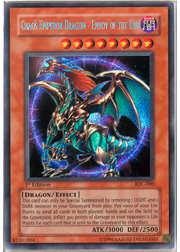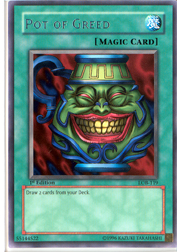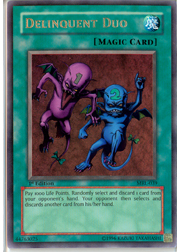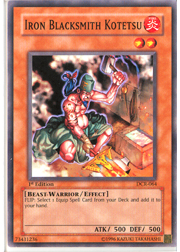

|
Doomkaiser Dragon
Card# CSOC-EN043


Doomkaiser Dragon's effect isn't just for Zombie World duelists: remember that its effect can swipe copies of Plaguespreader Zombie, too!
Click here for more
|
|
|

|
|
|

|
|
 |
 |
|
|
| |
|
 Has monster removal got you down? Can’t sleep at night for fear that Chaos Emperor Dragon is going to appear and blow up your field? Are you depressed that your hand disappears faster than the speed of light? Do you feel cheated every time Yata-Garasu appears on the field? If you’ve answered yes to any of these questions, chances are, you’re in dire need of my Little Black Book of Yu-Gi-Oh! Wisdom. It slices, it dices, and it even makes julienne fries! What would you expect to pay for such a gem? Fifty dollars? Fifty dollars and your best Yu-Gi-Oh! card? No way! Today on Metagame.com, you receive all this great information for the low price of your continued devotion to the great game known as Yu-Gi-Oh! Has monster removal got you down? Can’t sleep at night for fear that Chaos Emperor Dragon is going to appear and blow up your field? Are you depressed that your hand disappears faster than the speed of light? Do you feel cheated every time Yata-Garasu appears on the field? If you’ve answered yes to any of these questions, chances are, you’re in dire need of my Little Black Book of Yu-Gi-Oh! Wisdom. It slices, it dices, and it even makes julienne fries! What would you expect to pay for such a gem? Fifty dollars? Fifty dollars and your best Yu-Gi-Oh! card? No way! Today on Metagame.com, you receive all this great information for the low price of your continued devotion to the great game known as Yu-Gi-Oh!
My friend Tyrone asks, "Alan, what is this Little Black Book of Yu-Gi-Oh! Wisdom supposed to do?" Well, Tyrone, it teaches you how to become a better duelist. Most people have to pour over thousands of posts and conversations on message boards to try and glean any decent information on the Yu-Gi-Oh! metagame. In my little black book, I’ve already done that for you.
Whenever I create a deck, I look at what cards are currently being played. I try to analyze the deck’s weaknesses, but, more importantly, its strengths. I also try to look at what the deck has going for it, what power cards and tricks it needs, and, most importantly, what the deck’s victory condition will be. Additionally, I try to consider a familiar winning duelist’s playing style. There’s always that one kid who wins all of the tournaments at your local game store. Everyone tries to emulate his or her deck, and sometimes they succeed and do well, but they never really replace him or her as the top competitor. Chances are, he or she just understands the deck better. The more you play with a deck and get used to its specific capabilities, the better equipped you are to try and combat the various scenarios you will be up against.
How can you become a better duelist now, though? Play testing and reading countless threads on message boards about matchups and takes a lot of time. So, instead of pouring over tens of thousands of posts and conversations, I’ve narrowed it down to five tips that can dramatically improve your deck building and game play strategies.
Tip #1: Card advantage is crucial.
Card advantage simply means that you have more cards in your hand than your opponent. It is an incredible psychological advantage, as well as a tactical advantage. In any duel, whether casual or tournament, you generally hear the question, “How many cards are in your hand?” This is because that person is thinking about how best to utilize what's in his or her own hand. When a person hears an opponent give a response such as, “I have six cards in my hand,” whether it shows or not, he or she will start to panic. Those six cards could be anything, which is why almost immediately you will hear the follow-up question, “May I look through your graveyard?” This isn't just because your opponent is trying to remember what you played already. Instead, it’s to see if he or she can divine or guess what’s in your hand and how best to counter your next move. Sometimes, an opponent can make a grievous error because he or she is more concerned about what you could do than what you will do. So, remember, more cards in your hand are always good.
 This concept may seem completely obvious to you, but, if you don’t have cards in your hand, you’re not going to be able to do anything to your opponent. Utilizing card effects, which place more cards in your hand, is an important aspect to consider when building a deck. Cards, such as Pot of Greed or Graceful Charity, seem to be included in every deck because of their incredible ability to cycle through the deck faster and give the duelist more options. Jar of Greed also provides a fantastic way to get to cards you need from your deck faster. When building a deck, you generally want to stick to around 40 cards. This keeps the efficiency and reliability of your deck up. You tend to draw at least ten cards in any normal duel. This, plus the initial five opening cards, means that in any given duel you see at least fifteen cards; almost half of your deck. These fifteen cards are, generally, enough to end the duel, given that you draw the right ones. Also, by including three copies of your game-winning combo, you increase the chance of drawing it quicker. Cards that accelerate your ability to draw more cards make the deck a lot more reliable and efficient. This concept may seem completely obvious to you, but, if you don’t have cards in your hand, you’re not going to be able to do anything to your opponent. Utilizing card effects, which place more cards in your hand, is an important aspect to consider when building a deck. Cards, such as Pot of Greed or Graceful Charity, seem to be included in every deck because of their incredible ability to cycle through the deck faster and give the duelist more options. Jar of Greed also provides a fantastic way to get to cards you need from your deck faster. When building a deck, you generally want to stick to around 40 cards. This keeps the efficiency and reliability of your deck up. You tend to draw at least ten cards in any normal duel. This, plus the initial five opening cards, means that in any given duel you see at least fifteen cards; almost half of your deck. These fifteen cards are, generally, enough to end the duel, given that you draw the right ones. Also, by including three copies of your game-winning combo, you increase the chance of drawing it quicker. Cards that accelerate your ability to draw more cards make the deck a lot more reliable and efficient.
Tip #2: The current Yu-Gi-Oh! tournament environment is heavy on control. Plan accordingly.
The term “control” is tossed around a lot at stores and tournaments. How do you best control the field? How do you best control the hand? Are you in control of the situation? When can you take control of an opponent’s card? All of these questions encompass what control represents. Control simply means that your deck focuses around utilizing your opponent’s strategy against himself or herself.
 Generally, spell and trap cards are used to further these ends. Cards such as Delinquent Duo, Confiscation, Drop-Off, and The Forceful Sentry focus around removing cards from or preventing cards from being in your opponent’s hand. However, monsters play an integral part as well. While the spell and trap cards are limiting the opponent’s options, the monsters take over by removing cards while dealing damage. Generally, spell and trap cards are used to further these ends. Cards such as Delinquent Duo, Confiscation, Drop-Off, and The Forceful Sentry focus around removing cards from or preventing cards from being in your opponent’s hand. However, monsters play an integral part as well. While the spell and trap cards are limiting the opponent’s options, the monsters take over by removing cards while dealing damage.
Control decks tend to run light on monsters and heavy on spells. Averaging about 15-21 spells per deck; these decks become easier to plan for. Including cards, such as Magic Jammer and Imperial Order, to either your main deck or to your side deck will greatly decrease your opponent’s chances of being able to empty your hand.
There are three strategies that prove to be the most effective when combating a control heavy environment.
The first is not to run a control deck yourself. The Control deck mirror match is the most common matchup in the current metagame. And, depending on the players, it comes down to the player that draws the right cards at the right time.
The second strategy is to play conservatively. Don’t give up cards in your hand if it’s not going to put some serious hurt to your opponent’s life points. Hold back, see what he or she is going to do, and then strike. Control relies upon the opponent putting out something that is going to further his or her end—don't give your opponent that window to react. One of the best side deck cards you can include in a Control matchup is Soul Release. Use Soul Release to remove your own monsters, as well as your opponent’s. Your opponent won’t be able to revive anything that gets discarded to the graveyard if it isn’t there.
The third strategy is based on the fact that Control decks are slow. They usually go 10–15 turns before they pull off a victory. Generally, this is because they have no victory condition. Cards that not only increase card advantage, but also get you to better cards faster, can mean the difference between victory and defeat.
Tip #3: Make good use of equip spells.
 Dark Crisis brought with it one of the most underused and unappreciated searcher cards ever made, Iron Blacksmith Kotetsu. While seeing a brief stint in Exodia decks to search for Butterfly Dagger - Elma, it hasn't seen any real use outside of that one particular deck. Why, you might ask? It’s because equip spell cards, generally, just aren’t used. There are only a couple which see a lot of game play, such as Premature Burial or Snatch Steal. Dark Crisis brought with it one of the most underused and unappreciated searcher cards ever made, Iron Blacksmith Kotetsu. While seeing a brief stint in Exodia decks to search for Butterfly Dagger - Elma, it hasn't seen any real use outside of that one particular deck. Why, you might ask? It’s because equip spell cards, generally, just aren’t used. There are only a couple which see a lot of game play, such as Premature Burial or Snatch Steal.
Equip spell cards can play an integral role in your deck construction. They can power-up your monsters or provide tricks to support them. People overlook equip spell cards, as they are an unknown quantity. They appear riskier to run than trap cards, but when utilized properly, they can have a devastating effect.
The psychological advantage to running many equip spells is great because it’s not a common strategy. Most duelists are planning for some sort of Control, or the latest Beatdown strategy. By playing equip spell cards, you tell your opponent one thing—that you’ve evaluated the card pool. It will be evident that you’ve taken the time to learn just what makes a good strategy, that you are original, and that your opponent doesn’t have the strategy to contend with you.
Okay, so that was a little dramatic. Yes, there are plenty of things to take out equip spell cards, namely cards that focus directly against them. But, the beauty is, no one runs those. Let’s say you run Black Pendant. You set it on the field, as you feel it would be better suited at a different time. Sure enough, here comes your opponent with a Mystical Space Typhoon in hand to destroy it, but, instead, he or she loses life points. No sweat off of your brow!
One thing I would recommend is to try and build a deck around the card Falling Down. Try focusing it around taking control of all of your opponent’s monsters, while using your own Archfiends to smack him or her down. Or, why not build a deck around exploiting Axe of Despair’s ability to return to the top of the deck?
Any way you go with it, it’s sure to make both you and your opponents think twice before discounting equip spell cards.
Tip #4: Don’t be too hesitant to lay down traps or fake out opponents by setting spell cards.
I’ve talked a lot about psychological advantages over your opponent, and it is no different with this tip. What it all comes down to, in the end, is who plays the most aggressively and wants to win more. Playing mind games with your opponent is key when playing any trading card game.
Yu-Gi-Oh! has a leg up on most games, because a good portion of the time, your opponent has no idea what you have in store. This is because you set cards, or play them face down. Because cards are placed face down, your opponent is forced to consider the options each time he or she goes to activate a card or summon a monster. Generally speaking, duelists are too hesitant to activate anything unless the opponent has some sort of removal that is going to guarantee the card will no longer be there before they activate it.
This is why faking your opponent out is so important. It forces your opponent to over-think a play, and to use up cards that would be better used elsewhere. Setting cards that are not needed for the duel face down creates a distraction for the opponent. He or she won't know what’s there, so it creates hesitancy towards your board position. A truly aggressive player will still go for the attack, but a player that isn’t too sure of him or herself won't. This buys you time to be able to combat your opponent in a more effective manner.
It is always a good idea to evaluate your opponent. Is he or she playing defensively or aggressively? Is he or she the kind of player that is prone to rash decisions? What kind of person is your opponent? Answer these questions, and then attempt your move. Try to bluff. Most people aren’t expecting it, so what can it hurt? Just make sure you aren’t sacrificing card advantage or board position while doing so.
Tip #5: Take time to evaluate your opponent’s deck strategy.
Yu-Gi-Oh! is all about learning to deal with different opponents, learning to deal with your own flaws, and learning how to recognize your opponent’s flaws. You’ve got the time. When dueling, don’t just consider what’s in the deck, look at your opponent and see how he or she duels. Dueling is going way beyond the cards in your deck. Why not try playing defensively against your opponent the first round of the duel? Lull him or her into a false sense of security, especially when you have an aggressive deck. See what kinds of cards you're dealing with, and what the opposing deck strategy is. Then, in the second or third duels make, rush with your swarm of high ATK monsters.
One of the best tournament strategies I’ve used is losing the first duel intentionally. As a general rule of thumb, your opponent won’t utilize his or her side deck because you lost the first duel, and he or she is now over-confident. Your opponent is only going to know what’s in your deck by what can be seen on the field. Don’t place cards down during the first duel, unless it is to prolong the game and give you ample time to evaluate your opponent's style of play.
Above all, remember that this is fun. If you’re going to get better, you need to enjoy playing. Encourage table talk. The more you talk with other players, the more your own knowledge will expand. Be friendly toward your opponents. There are too many who tend to forget that they are talking to other human beings who are evaluating them as well. Friendliness and openness convey a sense of security. Once your opponent is secure, that is the time you should be on the attack. Who knows, once you’re done dueling with them, they may come out your friends.
This ends volume 1 of The Little Black Book of Yu-Gi-Oh! Wisdom. Thank you for reading it! Return each week to read up on all the latest strategies right here at Metagame.com. Any questions, comments, or complaints about this article can be sent to AlanC_writer@hotmail.com. Please include your name when writing. Good luck!
|
| |
| Top of Page |
|
 |
| |
 |